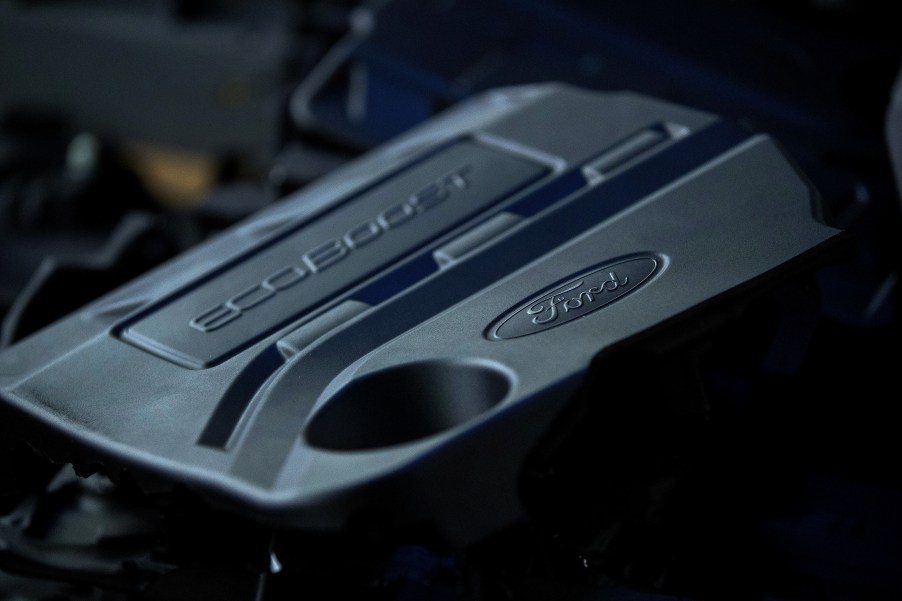
Ford Fuel Injection Patent Lawsuit Ignites Again in Court
Like several other automakers, Ford has been in legal hot water in the past. Usually, the courtroom drama centers around mechanical problems or design flaw accusations. Case in point, as I write this, Ford is facing another PowerShift transmission lawsuit. But those aren’t the only issues that require judiciary involvement—so do intellectual property disputes. And that’s what Ford might be facing, again, with a revived fuel injection patent lawsuit.
A new court decision injections new life into a Ford fuel injection patent lawsuit

No matter what fuel-injected car you have, it almost certainly relies on fuel injectors the automaker bought from a supplier. However, while the automaker doesn’t make all the parts, it does design the system. And depending on how novel that design is, the company can receive patents for it. Then, if another entity, say, tries to copy the technology in the patent, the patent-holder can demand restitution from IP theft. That’s basically what three Massachusetts Institute of Technology researchers accused Ford of doing with their fuel injection design in 2019.
The trio originally collaborated with Ford to develop new powertrain, fuel, and energy tech, with one result being a combination direct-and-port fuel injection system. However, after Ford reportedly found the researchers’ behavior rather greedy, the collab started breaking down. Then, after MIT transferred the patent rights to the trio, they founded Ethanol Boosting Systems LLC and tried licensing the tech to Ford. But the Blue Oval refused.
Shortly afterward, though, Ford introduced the second-gen EcoBoost V6, with direct and port fuel injection. At which point, MIT and EBS filed a lawsuit claiming Ford was using stolen patented technology. But in 2020, a Delaware judge ruled in Ford’s favor, noting that EBS’ fuel injection system relied on gasoline and ethanol, while the EcoBoost’s version used solely gasoline. And that, seemingly, was that.
However, MIT and EBS appealed the decision. And on July 18th, the U.S. Court of Appeals for the Federal Circuit sided with them, Ford Authority reports. According to the appeals court, the Delaware court misinterpreted the patents: they don’t specify if the system needs two different fuels.
In short, Ford could be in for some legal wrangling over its fuel injection systems.
What Ford engines are included in this fuel injection patent lawsuit?

Originally, this fuel injection lawsuit centered on the dual-injection Ford EcoBoost engine family. Today, that family includes the OG 3.5-liter V6 as well as a 3.0-liter and a 2.7-liter twin-turbo V6. Ford also offers 2.0-liter and 1.5-liter EcoBoost four-cylinder engines in the U.S. And not just in Fords—the Lincoln Corsair and Nautilus have 2.0-liter EcoBoosts. In addition, international Ford customers have three-cylinder EcoBoost engine options.
However, Ford doesn’t just use this style of fuel injection in its EcoBoost engines. The current Mustang GT’s 5.0-liter Coyote V8, for example, originally only had port injection. But in 2018, Ford added direct injection, which increased horsepower, torque, and fuel efficiency. The current F-150’s 5.0-liter V8 and 3.3-liter V6 have dual direct-and-port setups, too.
As a result of this proliferation, these engines are also technically part of this lawsuit. And so is any other Ford engine with this dual fuel injection system.
What does this mean for Ford car, SUV, and truck owners?
As of this writing, neither Ford, MIT, nor EBS have commented on the appeals court’s decision. But as Ford Authority notes, this decision does revive the original lawsuit. So, at some point, Ford might end up in court again.
Yet while this legal snarl involves engine technology, if you own a dual-injection Ford, don’t worry. The goal of the original lawsuit was for Ford to pay royalties to the patent-holders. It’s not like some repo man is going to come ‘round your garage and rip out your Ford F-150’s or Mustang’s fuel injection system.
However, if Ford eventually loses the lawsuit, it might need to rethink its fuel management designs. And if it does, it could mean future Ford engines won’t feature the dual injection system. But that all depends on what happens in court.
Follow more updates from MotorBiscuit on our Facebook page.


